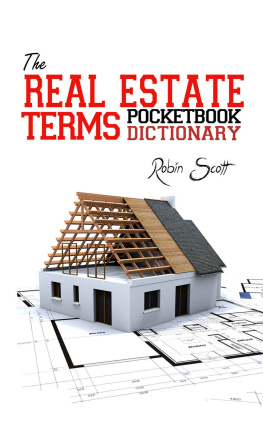The Art of Real Estate
Appraisal, 2nd Edition
The Complete Guide for
Homeowners and Real Estate
Professionals
William L. Ventolo, Jr.
Martha R. Williams, J.D.

Contents
Just as financing is essential to almost all . An appraisal is a supportable opinion of value. A reliable opinion of the value of property is sought for many different reasons. The seller wants to know the value of his or her property to determine an appropriate selling price; the buyer will rely on an accurate appraisal to be sure the property is fairly priced by the seller; and the broker wants to realize the maximum commission on the sale. In addition, financial institutions insist on an appraisal to determine the amount of money they should lend to a loan applicant. Appraisals are also used to determine value for taxation and insurance purposes, as well as for condemnation proceedings.
The Art of Real Estate Appraisal provides a first exposure to the principles and techniques of appraising residential properties. Assuming that the reader has no prior knowledge of appraising, the book is designed to help homeowners, agents, and investors relate appraisal theory and techniques to their practical concerns regarding property value.
Accurate appraising is a highly developed skill, perhaps even an art in some cases, and we have no illusions that we can turn you into a professional appraiser in a handful of pages. We will, however, tell you a little bit about the theory behind appraising, how professional appraisers go about it, and how you can perhaps adapt some of their techniques in making your own rough determination of property value.
When property values are rising, there are few complaints or concerns about appraisals. A seller can ask a record high price for the neighborhoodand buyers respond with multiple bids over the asking price. The buyer who wins the property is congratulated and starts counting the profit that will result from such a wise investment even before the ink dries on the deed. Did the appraisal indicate a market value less than the sales price? No problemjust remind the appraiser to look at the asking prices of other properties coming on the market (even higher!) and to take that factor into consideration.
When property values start to decline, however, property appraisals receive considerably more interest. Why should the asking prices of other properties be considered? So what if they seem to indicate that the market has taken a downturn? What about all the sales from the peak of the marketlast year?
Other factors that add to the consternation of sellers and buyers when the market moves through its usual cyclical changes and values become difficult to predict include interest rates, construction starts, the unemployment rate, and the criteria that lenders use to make loans, among others. Suddenly, appraisers must be licensed or certified and conform to something called the Uniform Standards of Professional Appraisal Practice (USPAP).
The past three decades have seen wild fluctuations in interest rates that would make the current market seem a buyers paradise, if not for the fact that prices have increased exponentially as interest rates have gone down. The recent drop in property values has been hard on buyers who bought at the markets peak just a few years ago, but in most parts of the country, the lower property values still represent several multiples of what prices were even 10 years ago. Of course, there are always those areas that seem immune to economic forces, with property prices that seem to be at their peakand then go even higher. Ironically, some of the highest-priced parts of the country tend to be the ones that experience continuing high demand.
But if you did buy your home at the peak of the market and now are dismayed to see other homes like yours selling for prices that are a lot lower than the price you paid, the coup de grace comes when the bill from the tax collector arrives. Somehow, tax collectors know when property values are going up, but seem reluctant to acknowledge that they have gone down. What can you do to convince the tax collector that you paid more than your homes current market value?
How can a homeowneror prospective homeownerget a handle on what a home is actually worth? By understanding how market value is determined and how it can be influenced.
The Art of Real Estate Appraisal was written in response to the need for a laymans explanation of the basics of the appraisal process. Readers interested in buying or selling their own home, refinancing their mortgage, or remodeling for value will find this book useful. If you are a homeseller, learning about the appraisal process can help you set a realistic asking price for your property, which will produce a faster sale at a price near that goal. If you are a homebuyer, an understanding of the appraisal process will help you determine a fair offering price for the home you want to buy. A good working knowledge of the basic principles of property valuation should also be helpful when judging the accuracy of your tax assessment or considering a home improvement project.
Because almost every aspect of the real estate industry involves appraising, this book can be a useful learning tool, not only for prospective buyers and sellers, but for brokers, salespeople, mortgage brokers, loan agents, property managers, investors, and others. Knowing the basics of the appraisal process, for example, can help the real estate agent prepare a competitive market analysis (CMA). This is a service performed by the agent for a seller to show the approximate market value range of the sellers property, and by the agent for a buyer to determine the same information. A CMA, as you will learn, is based on the sales comparison approach, one of three methods used by appraisers to form an opinion of real estate value.
This book is not intended to replace the services of a professional appraiser. You wont find all there is to know about appraising by reading this book. But if we can explain how real estate values are determined and what the problems are in arriving at an opinion of a propertys fair market value, we will have accomplished our purpose.
The most important reason for having real estate appraised is to support a mortgage loan decision by a lender. Buyers and sellers are often convinced that they know the value of what they are gettingor turning over to someone else. Its the lender who needs to be convinced that the property has sufficient value to serve as security (collateral) for the loan the lender is being asked to make. If the owner simply wants to refinance an existing mortgage, the lender will want to make sure that the current market value of the property supports the new loan amount.
There are other reasons to order an appraisal, including the following:
Distribution of an estate. This is especially important if one of the heirs plans to purchase the interests of other heirs.
Division of property as part of a divorce. There will need to be a fair division of the equity in the home, particularly if one spouse transfers his or her share to the other spouse.
Property tax assessment. A homeowner who wants to contest the tax assessors valuation will need an appraisal to back up a claim of a lower value.
Reassessment of property value after improvements are made. Again, the tax assessors opinion may differ from the homeowners.
Determination of insured value. A homeowner should always insure property for its full replacement cost, so it is critical to know what that is.
Next page













